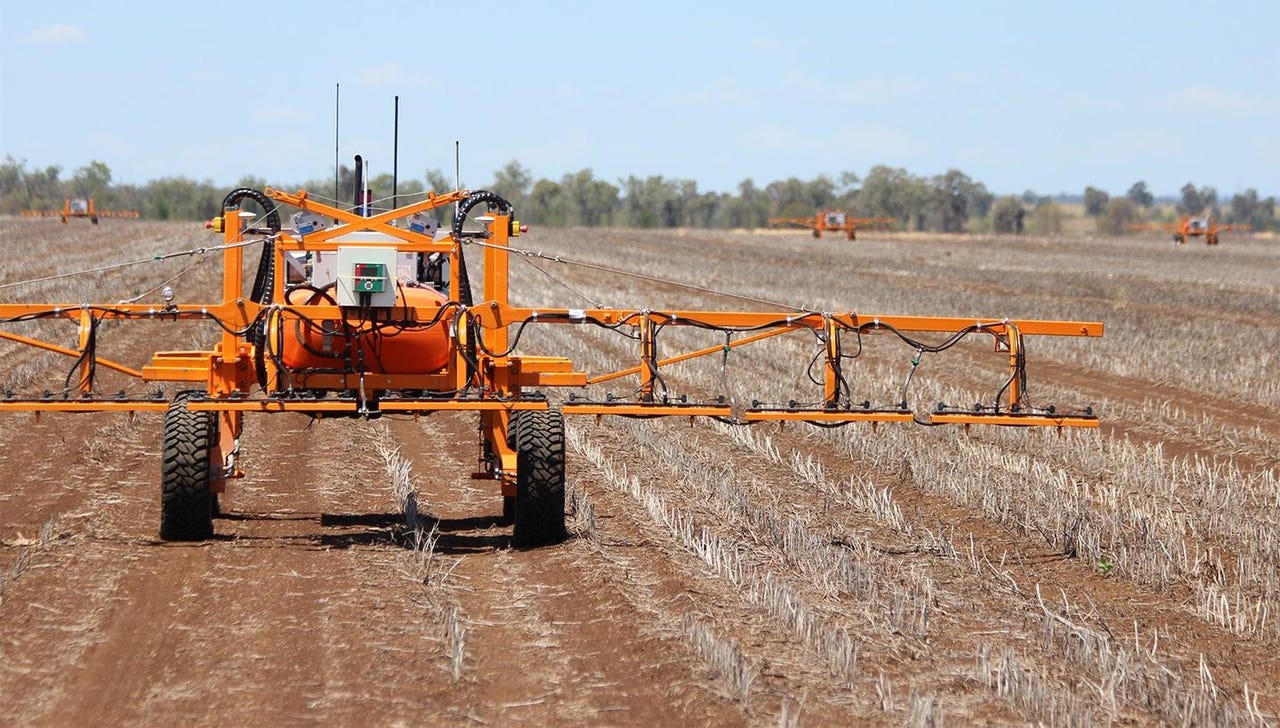SwarmFarm scales up with AU$250,000 QLD government grant


Queensland agriculture robotics firm SwarmFarm is looking to open a purpose-built office facility that will serve as the startup's headquarters after being awarded a AU$250,000 grant, as part of the Queensland government's AU$10 million Rural Economic Development (RED) grants program.
The new head office, expected to be completed by April 2020, will be located at Gindie, on the farm owned by SwarmFarm co-founders Andrew and Jocie Bates. It will replace the startup's existing headquarters that was setup using temporary demountable buildings.
"We're proud to be based on-farm because it keeps the technology real. It means that our engineers has to get out in the paddock to make the technology work. A big part of scaling up our business is so we can have facilities in which we can work from properly," Jocie Bates told ZDNet.
The facility will also serve as a space to host different agricultural groups, farmers, and tour groups.
"When it's technology, farmers want to check it out. They want to feel it, see it, and understand how to use it. We expect to have a lot of people come through our facility, who we'll be able to host," Bates said.
SwarmFarm was established in 2012. According to Bates, the idea was spurred by problems the couple faced on their own farm.
See also: Glossary: Smart farming (TechRepublic)
"The trend for many years in agriculture has been to get the biggest machine as possible -- it's almost a bit of an ego race -- and we thought how can we do this better," Bates said.
The company has since developed several robot prototypes to help farmers be more efficient in everyday activities including weed spraying, turf mowing,and slashing between orchards.
Last year, the company launched its first commercial robot, named Indigo, that uses the company's SwarmBot 5 platform. The robotic unit, which serves as an alternative to using a heavyweight tractor, is now being used on a turf farm and is fitted with a 3-metre mowing deck, which Bates expects can be used for other applications.
Bates said the company's next project -- which is expected to last for the next three years -- will be to create an herbicide sprayer off the back of SwarmBot 5 for the apple industry to help orchard growers accurately "spray on the run".
"We'll be able to look at the flower load and spray on the run based on how much we need by calculating the variable rates per tree," she said.
SwarmFarm now works with a business based in Toowoomba to manufacture its machines.
Using the funding grant, the company also expects to recruit an additional 15 full-time employees, including agricultural, mechatronics, software and mechanical engineers, which will double the existing headcount over the next 12-18 months. It's part of the company's plans to eventually grow the total headcount to 57 by June 2021, with most of the roles based in regional Australia.
"We really want to expand our team. Not all of our team will be based here, but we'll certainly have a home base, particularly for training. As our business scales, we'll have people come back to run machines, which will help upskill them," Bates said.
SwarmFarm is one of 15 businesses in Queensland to receive a RED grant that is designed to fund projects that contribute to economic development and job creation in regional areas. Under the first round, a total of AU $3.3 million was handed out.
The RED grant program will have three funding rounds over a three-year period ending in 2021. Funding for Round 2 of the RED grants will be announced later this year.
SwarmFarm, however, is not alone when it comes to using robots for farming. Spread, a Japanese sustainable vegetable producer, operates a farm run almost entirely by robots.
An indoor vertical prototype farm was also created in Cincinnati last year to prove that fully-automated indoor farming is not only safer, but also profitable.
Updated at 3.05pm AEST, 22 July 2019: Added information about other farming projects that uses robots.
Related Coverage
Victoria opens interest in AU$12 million IoT agriculture test
Grants of up to AU$30,000 to cover two-thirds of the cost of IoT equipment for suitable farmers.
IBM launches Watson tools for agriculture
IBM's Watson Decision Platform for Agriculture aims to harness multiple data points to provide insights on planting crops, plowing and harvesting.
Top 5 things to know about farm tech (TechRepublic)
Tom Merritt explores five ways technology is changing farming.
Smart farming: How IoT, robotics, and AI are tackling one of the biggest problems of the century (TechRepublic)
It's still early days for precision agriculture, but two UK-based projects are proving the feasibility and value of the concept.